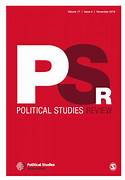External publications

Book Review: International Relations: The Realist Case for Global Reform
Goedeking, NicholasExternal Publications (2012)
in: Political Studies Review 10 (3), 423–424
DOI: https://doi.org/10.1111/j.1478-9302.2012.00279_24.x
Information
William Scheuerman's aim with this book is twofold. He wants to convince readers that realists have developed sound visions for global reform, and he wants to help present-day global reformers strengthen their case by building on realism. He does this by presenting a theory he calls progressive realism, based on midcentury realists such as E. H. Carr, Hans J. Morgenthau and Reinhold Niebuhr. The first half of the book discusses the internal dialectic of mid-twentieth-century progressive realism and its case for global reform; the second half educes reasons why contemporary advocates of global reform could benefit from engaging with the theory. Scheuerman begins by unravelling a stereotypical caricature of realism and replaces it with a more differentiated picture. He outlines a discrepancy between realism's tenets of human egoism and anarchy and the biographical backgrounds of the theory's leading mid-century figures. He argues that realists did not intend to eliminate morality from international relations but wanted to criticise the naïve belief that appeals to morality alone could solve power inequalities. Furthermore, he reasons that progressive realism saw the need for social integration prior to global governance for world polity to work effectively without extensive coercive force. Factual elements of the book are well researched and backed with convincing text passages. A critical eye may find minor ambiguities, but these do not impinge upon the overall reasoning, which is very persuasive. Nevertheless, Scheuerman's case is subject to two potential dangers. First, he may be perpetuating the political paradox when he writes that ‘immoral acts may sometimes be necessary if normatively admirable goals are to be secured’ (p. 102). If Scheuerman accepts this paradox he inevitably opens the door to exceptionalism. Second, he may be strengthening the status quo by indirectly legitimising the current political order by identifying a premature stage of global social tissue with the help of the dogma mentioned above and by creating an abstracted analytical framework. Since Scheuerman addresses the former but disregards the latter metaphysical objection, I conclude that he succeeds in developing a differentiated new perspective of realism but falls short with respect to a fully developed ontological account of his own perspective. This does not discredit Scheuerman's case. It simply points out the need for further analysis. The Realist Case for Global Reform is undoubtedly a rewarding read.
Contact
Cornelia Hornschild
Publication Coordinator
E-mail Cornelia.Hornschild@idos-research.de
Phone +49 (0)228 94927-135
Fax +49 (0)228 94927-130
Alexandra Fante
Librarian/ Open Access Coordinator
E-Mail Alexandra.Fante@idos-research.de
Telefon +49 (0)228 94927-321
Fax +49 (0)228 94927-130



![[Translate to English:] Photo: Alexandra Fante, Bibliothekarin/Open Access-Koordinatorin](/fileadmin/_processed_/f/0/csm__c_Deutsches-Institut-fuer-Entwicklungspolitik_Fante_94ce4fa1ba.jpg)